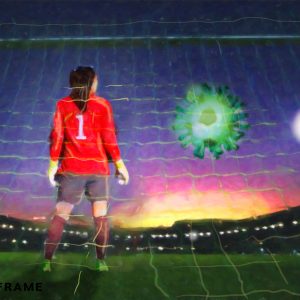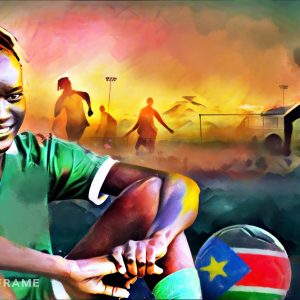Dumisani Chauke, netball coach supreme
The Spar Proteas assistant coach talks about her career, the house she has bought to accommodate her netball players, and the racial imbalance in the national team and how it can be fixed.
Author:
17 April 2021

The Covid-19-enforced lockdown has given Spar Proteas assistant coach Dumisani Chauke the opportunity to achieve a lifelong dream, one that will cement her netball legacy. Chauke is passionate about development and has a strong bond with her players at the Tshwane University of Technology (TUT), who see her as a mother figure and someone in whom they can confide.
“Last year, during the lockdown, I was bored,” said Chauke. “I had plenty of time. So I was browsing cars and houses. All of a sudden, I started getting interested in the houses right outside the campus. Within a walking distance from the campus.”
The 34-year-old ended up buying a house in Pretoria West to house her players who might have accommodation challenges. “It’s always been a dream of mine to have a netball complex,” she said. “This dream has always been there, I just never had the means.
“I thought, oh, I can buy this house and I can reserve one room where I can stay when I need the space. I can share it with my players that struggle with accommodation, because students do struggle for accommodation. An accommodation that is neat and close to campus. For now, I am quite strict because I only want my netball girls there. I know they will be safe, staying in a secure place that is neat, clean and right next to campus. And most importantly they can assist each other with schoolwork because they are all doing [sport-related studies].”
Chauke’s relationship with her players is such that some of them even braid her hair. “It’s one of tough love. I try to keep serious all the time but it’s kind of hard because they are so sweet, man. I mean sometimes I would go to my office around 9am, 9.30am and they are already there. If they don’t have class, they will be in the office,” said the TUT sport organiser.
Related article:
Chauke emphasises the importance of balancing academics and sport. Her netball complex has strict terms and conditions for players who are selected to stay there. Although the players need to do well in their sport, they also need to make sure that their academics are not left behind. The complex will also be key in building camaraderie with the players under one roof when they aren’t on the court or at university as they work towards being one of the competitive teams in South Africa.
“In my position at TUT as the sports organiser, I monitor them academically as well. Yes, I can monitor them from the office, just checking in the system, randomly going to their classes or checking with the lecturers. But I now can physically be with them at the house,” she said.
“I will be able to tell them that you have to do your academic work because in three to four years’ time, I need you to leave the house with a qualification, leave the university with a qualification, so that someone else can come. Because if you are going to take five years, you are robbing someone else of the opportunity to come in and get a netball bursary and the opportunities you got. That’s the kind of system we are cultivating at TUT, and now I am able to enforce it more outside of the campus.”
Chauke’s philanthropy goes further than housing her players. She also runs an organisation called the Dumisani Chauke Netball Foundation, whose focus is to reach as many young girls in impoverished areas around the country as possible, to provide them with everyday necessities such as toiletries and sanitary towels. In other cases, sneakers are part of the donation. Chauke hosts coaching clinics and life skills sessions to some of the schools and communities her foundation helps.
Chauke’s road to coaching
The name Dumisani Chauke stands tall in netballing circles. Although she had dreams of nurturing future stars as a coach after her playing career, she never thought the next stage of her netball life would progress as quickly as it has.
“Lana Krige nudged me to get into coaching. We did our SA Level 2 [coaching course] together. I started being a player-coach at the end of 2013,” she said.
The former goal shooter was thrown in at the deep end when Krige resigned from coaching at the then Nelson Mandela Metropolitan University (NMMU). She had been Krige’s assistant while still playing for the university. This made her transition into full-time coaching easier, although she doubted her abilities in the beginning. She was head coach of NMMU between 2014 and 2015, before TUT snapped her up.
“Lana had always encouraged us to coach. She was my mentor. Our relationship became stronger after that. She was already preparing me to take over because she wanted to take a break from coaching. I was worried about my age. I thought, ‘I’m so young.’ At first, I had a lot of self-doubts. I was like, ‘Who the hell do you think you are?’ But my confidence grew after that. I thought I could do this,” she said.
Related article:
Earlier in her tenure as head coach of Madibaz, she was playing for the Eastern Cape Aloes in the Brutal Fruit Netball league. Playing in the provincial structure in which some of the players she coached longed to play made her decide to hang up her trainers for a coaching board and whistle. This opened the door for her first national coaching job as the assistant coach of the Under-21 side, working with Dorette Badenhorst. The pair now manage the Spar Proteas together, with Badenhorst as the head coach, and they guided the side to glory in the 2019 African Netball Championships.
Chauke had a successful spell with the junior national team. She was the assistant coach when the team won their Africa Youth Netball qualifiers in Botswana in 2016 and finished sixth at the Netball Youth World Cup the following year. And she was the team manager when South Africa beat Jamaica to take gold at the World University Netball Championship in Miami in 2016.
Her progression to joining the senior national team seems predetermined after the work she put in at the junior level. She was one of Norma Plummer’s mentee coaches, who took turns learning from the renowned Australian coach in her last year in the country. Badenhorst and four-time league winner Jenny van Dyk also took part in this programme.
“The journey has been one of growth, both personally and in the netball game itself, because all of a sudden you’ve got to think globally. It’s been one of self-discovery as well.”
A child-friendly environment
As a national team coach, Chauke is required to travel around the country to scout and monitor the progress of players in various tournaments. As a mother of two, this requires a lot of planning. Her netball family have tried to make her life easier by accommodating her toddler, Sibu, on her travels. Tournament organisers help make sure Sibu is well taken care of. Coaches, players and other staff members take turns looking after her while Chauke is courtside, coaching.
“It was right after she was born in 2019. It was quite easy. I called Varsity Sport and I told Jana [Arlow, operational executive at Varsity Sport] that we’re not flying anywhere, I need to travel with Sibu. All I needed was to speak to her and she spoke to the bus company. They would organise a car seat for me on the bus when we travelled to Bloemfontein and at the hotel she would ask them to give me a room next to the reception so that the pram could have easy access. Being organised and planning ahead really helps.”
But there are some challenges in her job, such as the fact that the Proteas still don’t reflect the population of the country. The 2019 International Netball Federation World Cup squad only had four Black players in a team of 12. Chauke said it will take a while before the country sees more Black players wearing Spar Proteas colours. The economic scales are not balanced, which Chauke said contributes to the lack of Black netball players at the highest levels of the sport.
Related article:
“We are window-dressing the system. If we are gonna talk [about] transformation, we need to talk [about] transformation as a whole. We as Black people, it’s our responsibility. No one is going to do it for us. No one is going to create a system that is going to benefit someone else. We have to look after our own players. We need to prepare them so that they are so good enough not to be counted as a number, they are taken on their merit. Right now, we are counting numbers and ticking boxes,” she said.
“But we also cannot talk transformation at the elite level, we [have to] start at the grassroots. If you are going to take a kid out of a village, you need to understand their socioeconomic situation. People don’t want to go coach in the villages because there are no facilities and sometimes they don’t even have proper balls. Before we even talk about the elite level, we need to look at the actual problem, where they come from. How do we fix that first? If we can fix that, our whole team might be all Black.”



